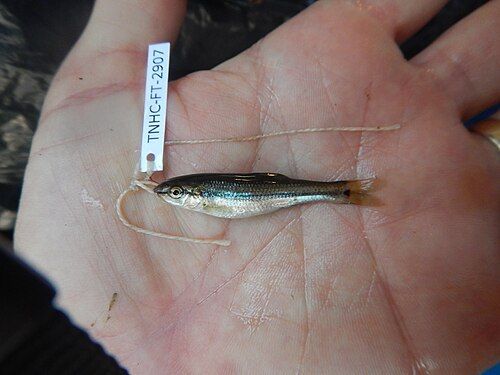Roundnose minnow
| Roundnose minnow | |
|---|---|
| Scientific classification | |
| Domain: | Eukaryota |
| Kingdom: | Animalia |
| Phylum: | Chordata |
| Class: | Actinopterygii |
| Order: | Cypriniformes |
| Family: | Cyprinidae |
| Subfamily: | Leuciscinae |
| Clade: | Pogonichthyinae |
| Genus: | Dionda |
| Species: | D. episcopa
|
| Binomial name | |
| Dionda episcopa Girard, 1856
| |
| Synonyms | |
| |
The roundnose minnow (Dionda episcopa) is a species of leuciscid fish found in southwestern North America.
Etymology
[edit]The genus name Dionda is of Native American origin. The species name episcopa is Latin for “pope”, and is named after John Pope who helped lead the party that collected the species holotype.[2]
Description
[edit]As the name implies, roundnose minnow have a rounded snout with a small subterminal mouth.[3] They also have 34-45 scales along their lateral line and 8 anal fin rays. Coloration usually includes olive green, white, and shades of yellow with a diagnostic black spot near the caudal fin base.[3]
Habitat and range
[edit]The roundnose minnow is found in the Colorado, San Antonio, upper Nueces and Rio Grande drainages in Texas and New Mexico in the United States and Mexico.[4] This species is locally abundant and is most common in spring-influenced streams with minimal temperature variation throughout the season.[5]
Diet
[edit]Roundnose minnow are generally considered herbivorous.[6]
Reproduction
[edit]Spawning occurs over gravel during the summer.[7]
Management
[edit]Little management for roundnose minnow occurs in the United States, as most populations appear stable.[1] They have been used as baitfish in New Mexico.[7]
References
[edit]- ^ a b NatureServe (2013). "Dionda episcopa". IUCN Red List of Threatened Species. 2013: e.T62199A15363731. doi:10.2305/IUCN.UK.2013-1.RLTS.T62199A15363731.en. Retrieved 18 November 2021.
- ^ Scharpf, Christopher (2024-12-27). "The ETYFish Project". Retrieved 2024-12-29.
- ^ a b Page, Lawrence M.; Burr, Brooks M., eds. (2011). Peterson field guide to freshwater fishes of North America north of Mexico (2 ed.). Houghton Mifflin Harcourt. ISBN 978-0-547-24206-4.
- ^ Froese, Rainer; Pauly, Daniel (eds.). "Dionda episcopa". FishBase. August 2011 version.
- ^ Hubbs, C., R. J. Edwards, and G. P. Garrett. 1991. An annotated checklist of the freshwater fishes of Texas, with keys to the identification of species. Texas Journal of Science, Supplement 43(4):1-56.
- ^ Hlohowskyj, C.P., M.M. Coburn, and T.M. Cavender. 1989. Comparison of a pharyngeal filtering apparatus in seven species of the herbivorous cyprinid genus, Hybognathus (Pisces: Cyprinidae). Copeia 1989(1):172-183.
- ^ a b Koster, W.J. 1957. Guide to the fishes of New Mexico. Univ. New Mexico Press, Albuquerque. 116 pp.


